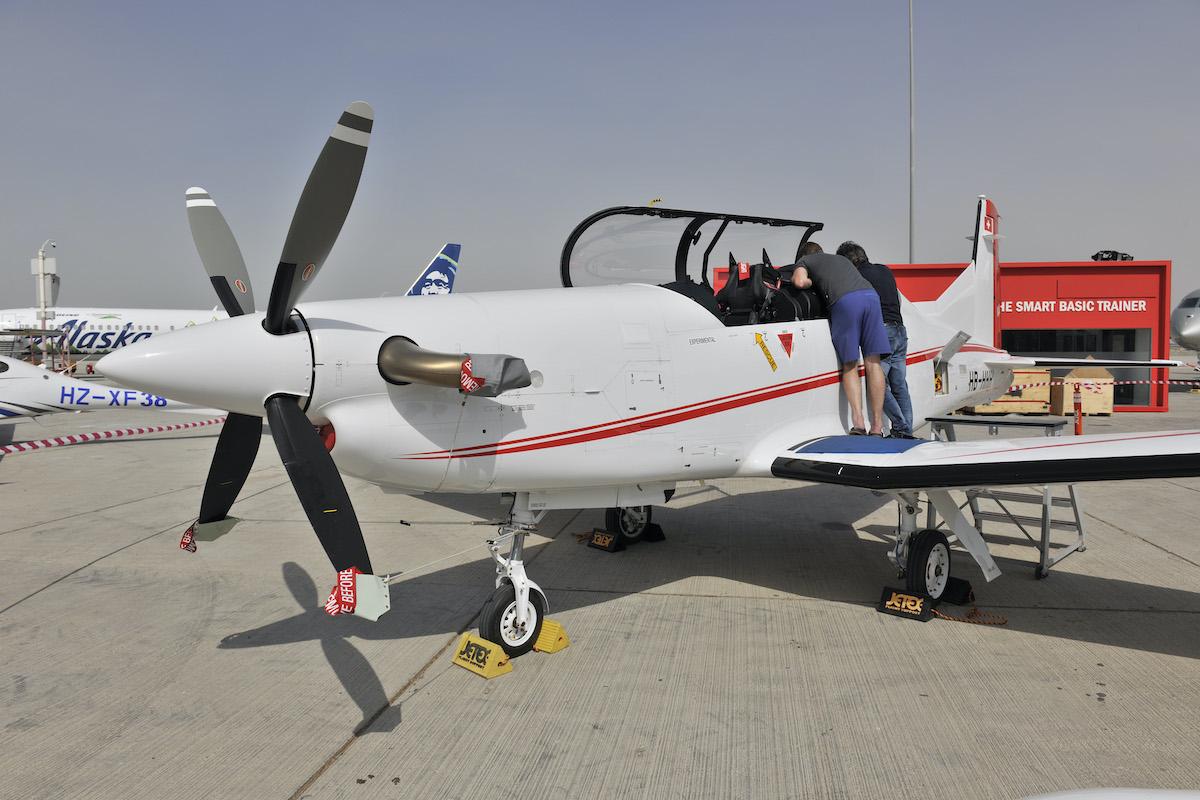
Latest PC-7 Variant Makes Airshow Debut
The PC-7 MKX—the newest version of Pilatus’ durable and popular light trainer—is making its public debut in the static display at the Dubai Airshow. The new iteration brings a host of current-generation technologies to the type which, the manufacturer says, will provide a training fleet capable of introducing new pilots to the kind of avionics that they will use on front-line combat aircraft on a platform “guaranteed to deliver a lifecycle of at least 30 years.” Part of the package available alongside the aircraft is a suite of ground-based training aids, which augment the expected full flight simulator and simple desktop systems with virtual-reality training tools. The first PC-7 prototype flew in 1966 and the type has been used for military training by over 20 nations, including several in the MENA region. The United Arab Emirates Air Force operates 31, more than any of the other trainers in its fleet.
Fortem Unveils Improved Counter-UAS System
Utah-based counter-UAS developer Fortem Technologies Inc. is using the Dubai Airshow to launch the latest iteration of its SkyDome product. The system pairs a series of low-cost radar sensors, called TrueView, with artificial intelligence algorithms that enable the detection, tracking and classification of multiple small airborne objects. It is designed to be installed in an area—a base, a campus, a city—and provide protection against rogue UAVs entering and operating within the area. Fortem has also developed a unique defeat mechanism called the DroneHunter, a small UAV equipped with a gun that fires a net to snare the target drone and then carries it on a tether to a safe location. SkyDome version 3.7 includes improvements which extend the system’s effective range, and also adds clutter-suppression algorithms that improve the system’s ability to successfully detect and take action against threat aircraft in high-density urban airspace. The company’s CEO, Timothy Bean, will be speaking about counter-UAS capabilities and lessons learned from their deployment in the USA Partnership Pavilion at 2 p.m. on Monday Nov. 15.
Collins Forms Next-Gen Composites Consortium
Collins Aerospace has joined with three other companies—Composite Integration, Crompton Mouldings and Bitrez—and the team has collectively been awarded a four-year grant of $3.6m by the UK's Aerospace Technology Institute to work on next-generation composites. The collaboration will develop complex-shaped composite components for future commercial aircraft, but will also look at how the systems that produce these components can be simplified and cost benefits realized. “Not only are new technologies needed to support next-gen aircraft, but also new processes that enable high-volume manufacturing using increased levels of automation,” Ed Dryden, vice president of actuation systems for Collins Aerospace, said in a media release. Collins’ portion of the work will be carried out at its plant in Banbury, England.
Two Russian Helos Make Airshow Debut
It is not the first time they have been seen outside their home country—both types have been deployed on active operations in Syria, and sold to other nations—but the Dubai Airshow marks the first time Russian Helicopters’ Ka-52 and Mi-28NE attack helicopters have appeared at an airshow outside Russia. Both aircraft appear in the flying display, with the company promising “elements of complex aerobatics used in real air combat maneuvers.”
Another international debut is promised from the Ka-226T Climber, which appeared in public for the first time at this year’s MAKS airshow in Moscow. The Climber variant has an increased flight speed and reduced unloaded weight compared to earlier 226T models. The company is also showing the heavy multipurpose helicopter Mi-171A2—its first appearance in the region—and two versions of the light multipurpose Ansat. One, carrying a medical module, will take part in the flying display, while the VIP Ansat Aurus, first exhibited at MAKS in 2019, will also be at the show.
RJAF Extends Inzpire Contract
Inzpire, the British defense training systems and services provider, has had its contract with the Royal Jordanian Air Force extended. The company initially supplied its GECO mission support system—which includes mission-planning and debriefing capabilities, as well as electronic flight-bag functionality, delivered on a tablet computer—to the RJAF in 2013. The new deal, of unspecified value or duration, extends software licenses and ongoing support.
GECO, which is among the technologies Inzpire are showcasing at the Airshow, has also recently been selected by Ascent Flight Training Ltd. to equip the UK Royal Air Force's fixed- and rotary-wing training fleet.
Another UK contract awarded to Inzpire and being announced during the Airshow sees them embarking on a nine-month project to carry out an analysis of the British military’s space training needs. The British defense ministry established a UK Space Command in April, and the new organization has to understand and identify its requirements to maintain existing skills and develop new ones. Inzpire's team will conduct an initial assessment before carrying out in-depth evaluations to identify training requirements for each role. At the end of the process the company will deliver a detailed training-needs report. The company carried out a similar analysis for the Royal Air Force's Protector unmanned aircraft system, and its specialists have advised on training development for electronic warfare systems.
Volo Aero Makes Airshow Debut
FAA- and EASA-certified MRO Volo Aero is celebrating its recently awarded AS9110C certification with the company’s first visit to the Dubai Airshow as an exhibitor. The East Longmeadow, Massachusetts-headquartered company has over 50 years experience supplying overhaul services to parts for a range of military and civil engines, including the Rolls Royce T56, Pratt & Whitney PW4000, and the CFM56. Volo Aero also acts as an aerospace MRO consultant, helping businesses implement changes and improvements.
Companies Combine For UAE SAR Center Of Excellence
Three companies—Australian radar developer Sentient Vision Systems, the Austrian-based Airborne Technologies and British integration house Phoenix Aerospace—have joined forces to establish a center of excellence for airborne AI sensors. The partnership, announced at the Dubai Airshow, has been built around a project to bring a new maritime search-and-rescue pod capability to the Emirates market. The ViDAR SCAR (self-contained aerial reconnaissance) pod has been flying on a Twin Otter demonstrator, but the consortium is promoting it for operations on an AW-139 helicopter. The pods include not just the ultra-high-resolution day/night sensors but image-processing hardware as well. The pod is capable of operating searches autonomously. Platform integration trials are provided by Airborne Technologies while Phoenix will provide installation and on-the-ground support throughout the Middle East. Sentient has field integration teams which will assist customers with pod integration and can provide operator training.
